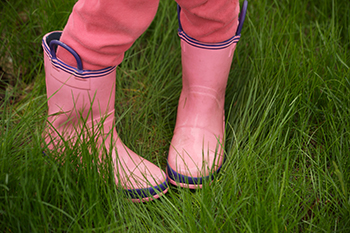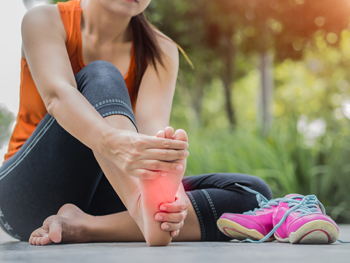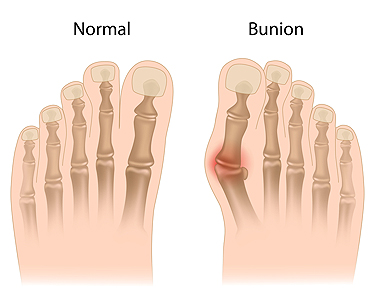
 (732) 246-1377
(732) 246-1377
 (732) 246-1377
(732) 246-1377
Gait problems in children often begin with noticeable issues in the feet, toes, or ankles. These may include in-toeing or out-toeing. In-toeing happens when the feet point inward while walking and is often seen in younger children. It may be caused by a curved shape of the foot or the way the leg bones twist inward. Out-toeing, when the feet point outward, is more common in older children and may be due to outward twisting of the leg bones. Some children may also appear flatfooted, meaning the arches of the feet are low or missing, although the foot usually stays flexible. A podiatrist can examine how your child stands and walks to see if their walking pattern falls within normal growth changes. Many children outgrow these issues, but a podiatrist can track their progress to determine if treatment is needed. In rare cases, surgery may be recommended if the gait problem is severe and affects movement. If your child exhibits an unusual or abnormal gait, it is suggested that you schedule an appointment with a podiatrist for an exam, diagnosis, and appropriate treatment.
Making sure that your children maintain good foot health is very important as they grow. If you have any questions, contact one of our podiatrists of Livingston Footcare. Our doctors can provide the care you need to keep you pain-free and on your feet.
Keeping Children's Feet Healthy
Having healthy feet during childhood can help prevent medical problems later in life, namely in the back and legs. As children grow, their feet require different types of care. Here are some things to consider...
Although babies do not walk yet, it is still very important to take care of their feet.
Avoid putting tight shoes or socks on his or her feet.
Allow the baby to stretch and kick his or her feet to feel comfortable.
As a toddler, kids are now on the move and begin to develop differently. At this age, toddlers are getting a feel for walking, so don’t be alarmed if your toddler is unsteady or ‘walks funny’.
As your child gets older, it is important to teach them how to take care of their feet.
Show them proper hygiene to prevent infections such as fungus.
Be watchful for any pain or injury.
Have all injuries checked by a doctor as soon as possible.
Comfortable, protective shoes should always be worn, especially at play.
If you have any questions please feel free to contact our office located in North Brunswick, NJ . We offer the newest diagnostic and treatment technologies for all your foot and ankle needs.

Running places significant stress on the feet and toes, making them prone to injury, especially over long distances or running downhill. One common issue is runner’s toe, medically known as a subungual hematoma, which develops when the toenail repeatedly strikes the inside of your shoe. This can lead to bleeding beneath the nail, resulting in changes in nail color, pain, and sometimes nail loss. Poorly fitting running shoes, tight socks, and heat-induced foot swelling can increase the risk. The big toe is most often affected, but the second through fifth toes may also suffer damage from shoe pressure or toe-on-toe friction. In some cases, the nail becomes thick, loose, or may fall off entirely. Repeated trauma may also lead to fungal infection or nail deformity. A podiatrist can assess the extent of the injury and determine if the nail bed or bone has been affected. Treatment includes draining any fluid buildup or in some cases removing the damaged nail. If you have problematic or painful toes that impede your running activities, it is suggested that you schedule an appointment with a podiatrist for an exam and appropriate treatment.
Toe pain can disrupt your daily activities. If you have any concerns, contact one of our podiatrists of Livingston Footcare. Our doctors can provide the care you need to keep you pain-free and on your feet.
What Causes Toe Pain?
Most severe toe pain is caused due to a sports injury, trauma from dropping something heavy on the toe, or bumping into something rigid. Other problems can develop over time for various reasons.
Toe pain can be caused by one or more ailments. The most common include:
When to See a Podiatrist
Diagnosis
In many cases the cause of toe pain is obvious, but in others, a podiatrist may want to use more advanced methods to determine the problem. These can range from simple visual inspections and sensation tests to X-rays and MRI scans. Prior medical history, family medical history, and any recent physical traumatic events will all be taken into consideration for a proper diagnosis.
Treatment
Treatments for toe pain and injuries vary and may include shoe inserts, padding, taping, medicines, injections, and in some cases, surgery. If you believe that you have broken a toe, please see a podiatrist as soon as possible.
If you have any questions please feel free to contact our office located in North Brunswick, NJ . We offer the newest diagnostic tools and technology to treat your foot and ankle needs.

Bunions are bony bumps that form at the base of the big toe as the tip of the toe angles toward the second toe. Bunions are common among women, especially those who wear tight or high-heeled shoes, and older adults, whose joints may naturally weaken over time. Symptoms include pain, swelling, and redness surrounding the affected area, with the bunion becoming more noticeable as it grows. The condition can make walking uncomfortable and cause difficulty fitting into shoes. The primary cause of bunions is abnormal foot mechanics, often made worse by wearing ill-fitting shoes or having a family history of the condition. Arthritis or other joint conditions can also contribute to bunion development. A podiatrist can help by offering custom orthotics, padding, or shoe modifications to alleviate pain. In severe cases, surgery may be prescribed to correct the deformity. If you are have a painful bunion, it is suggested that you schedule an appointment with a podiatrist.
If you are suffering from bunions, contact one of our podiatrists of Livingston Footcare. Our doctors can provide the care you need to keep you pain-free and on your feet.
What Is a Bunion?
A bunion is formed of swollen tissue or an enlargement of boney growth, usually located at the base joint of the toe that connects to the foot. The swelling occurs due to the bones in the big toe shifting inward, which impacts the other toes of the foot. This causes the area around the base of the big toe to become inflamed and painful.
Why Do Bunions Form?
Genetics – Susceptibility to bunions are often hereditary
Stress on the feet – Poorly fitted and uncomfortable footwear that places stress on feet, such as heels, can worsen existing bunions
How Are Bunions Diagnosed?
Doctors often perform two tests – blood tests and x-rays – when trying to diagnose bunions, especially in the early stages of development. Blood tests help determine if the foot pain is being caused by something else, such as arthritis, while x-rays provide a clear picture of your bone structure to your doctor.
How Are Bunions Treated?
If you have any questions, please feel free to contact our office located in North Brunswick, NJ . We offer the newest diagnostic and treatment technologies for all your foot care needs.